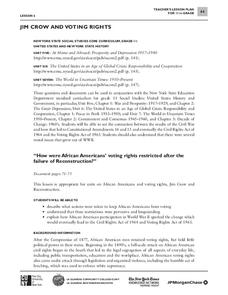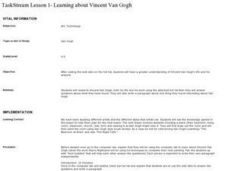Center for Civic Education
The Power of Nonviolence: Change Through Strategic Nonviolent Action
How did major historical figures, such as Henry David Thoreau, Susan B. Anthony, and Mohandas K. Gandhi, explain and defend their beliefs in nonviolence? Your learners will begin by studying the backgrounds of these individuals, and then...
Curated OER
Participation in Local and State Government
Students investigate the state and local levels of government. They demonstrate an examineing of government at these levels. The identification of officials and resources can be used for assessment.
Curated OER
Early Presidents
Students are introduced to the lives and contributions of the first seven presidents of the United States. They, in groups, conduct further research on one of these president and his political platform and design a presentation for the...
City University of New York
Jim Crow and Voting Rights
Class groups examine primary source documents to determine how the voting rights of African Americans were restricted after the failure of Reconstruction, and how African American participation in World War II lead to change.
Library of Congress
The Emancipation Proclamation and the Thirteenth Amendment
How did the Emancipation Proclamation lead to the Thirteenth Amendment? Middle schoolers analyze primary source documents including the text of the Emancipation Proclamation, political cartoons, photographs, and prints to understand the...
Curated OER
An Introduction to Law
With so many different types of law, it can be difficult for learners to discern which is which! Use a newspaper to give tangible examples of various types of law, including criminal, civil, consumer, family, local, state, federal and...
Curated OER
An Introduction To Law
Students identify 4 branches of law-criminal, civil, consumer, and family. using a newspaper, they locate examples of how laws affect citizens on a daily basis.
Constitutional Rights Foundation
Unauthorized Immigration and the US Economy
As part of a study of immigration and the U.S. economy, class members assume the role of newspaper editors to determine which submitted letters to print on their paper's editorial page to present a balanced view of the debate.
Curated OER
Who's Who in Government: Past, Present and Future
Twelfth graders research a list of governmental leaders of South Carolina's past and present. They briefly identify each by writing a short summary which includes the dates of their political career, party affiliation, positions held in...
Curated OER
Which Court Would You Use?
Students study court system and the various levels of courts in their state. In groups, they create their own brief scenario for each court they have studied. As a follow-up activity, they match given scenarios to the correct court, as...
Curated OER
The Duties of Governments: Dix vs. Pierce
Students examine the role of Dorothea Dix on behalf of people with disabilities. They discuss President Pierce's veto of legislation she helped create. They address the rights and responsibilities of citizen's and the role of government.
Curated OER
Abolitionists and Their Impact on Sectionalism
Eleventh graders examine the impact of Abolitionist leaders on sectionalism. In small groups, they conduct research on a famous abolitionist, and develop and write a newspaper cover page based on their assigned abolitionist.
Curated OER
How to Become a Member of Congress
High schoolers identify requirements for becoming a U.S. Representative or a U.S. Senator, explain procedure for running for representative or senator, and create an informational brochure.
Middle Tennessee State University
Fights, Freedom, and Fraud: Voting Rights in the Reconstruction Era
As part of a study of post Civil War era, young historians investigate the changes in voting rights during the Reconstruction Era (1863-1876), the fraud involved in the Hayes-Tilden presidential election of 1876, and efforts by Pap...
Constitutional Rights Foundation
Immigration Enforcement Raids
Class groups take on the role of advisors to the Assistant Secretary of the Office of Policy & Planning of ICE. Their charge is to prepare a report for the secretary on the effectiveness of enforcement actions of the ICE in stemming...
Curated OER
South Carolina and Quebec - A Comparative Study
Students compare the structure and functions of the state government of South Carolina and the provincial government of Quebec. They examine the role of political parties and differing expressions of democracy and make a...
Curated OER
A Share in America
Students examine map - reflect on why English colonist kept coming to America (scarcity of land in England / seemingly endless land in America)
Recite line from English poem. They discuss English attitude towards Indians and their lands.
Curated OER
Learning about Vincent Van Gogh
Students conduct research on the life and artwork of Vincent Van Gogh. They explore various websites, answer research questions and write a paragraph about the information found online, and discuss as a class what makes Van Gogh's...
Curated OER
Colorado Water, Water Rights and Ditches
Students do various activities and research on the history of Colorado water rights and local ditches and evaluate current situations in terms of water rights, water sources, ditches,as well as how different groups have been affected by...
Curated OER
The Embodied Presidency
Tenth graders analyze Roosevelt's Fireside Chats. In this Franklin D. Roosevelt presidency, 10th graders determine how well FDR's government programs aided victims of the Great Depression. Students examine selected Fireside Chats and...
Curated OER
Mueller v. Allen
Students investigate a First Amendment legal case involving religion, education, and reimbursement of tuition payments. They research the background of the cases and its precedents.
Curated OER
Justice
Young scholars discuss strengths and weaknesses of the court system in providing equal justice for all. They identify factors that cause these weaknesses and recommend solutions.
Curated OER
Living Under the Illinois Black Codes
Students use the text of the Illinois Black Codes to examine the laws in place. Using this information, they draw their own conclusions about why the laws existed in a free state. They also identify the purpose of these laws and how they...
Foreign Policy Research Institute
Understanding China: The Prospects for Democracy in China
This document provides useful information for a unit on democracy in China. While it does not include detailed activities, it does have a list of democratic principles, and important facts about China that facilitate understanding of its...

























